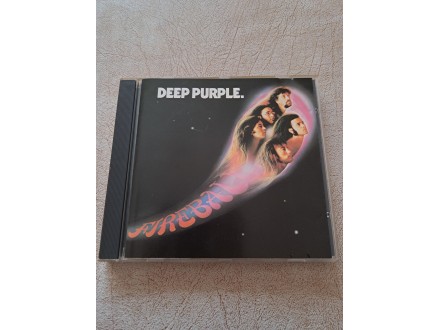Deep Purple - Fireball
| Cena: |
| Želi ovaj predmet: | 2 |
| Stanje: | Polovan bez oštećenja |
| Garancija: | Ne |
| Isporuka: | CC paket (Pošta) Post Express Lično preuzimanje |
| Plaćanje: | Tekući račun (pre slanja) Lično |
| Grad: |
Novi Sad, Novi Sad |
Izdavač: Ostalo
Žanr: Hard Rok i Metal, Rok
Poreklo: Strani izvođač
Original, made in UK
Knjizica od 4 str.
Odlicno ocuvano
knjizica 5 Cd 5
Studio album by Deep Purple
Released July 1971 (US)[1]
September 1971 (UK)[2]
Recorded September 1970 – June 1971
Studio De Lane Lea Studios and Olympic Studios, London, The Hermitage, Welcombe, North Devon
Genre
Hard rockheavy metal
Length 40:30
Label Harvest
Producer Deep Purple
Deep Purple chronology
Deep Purple in Rock
(1970) Fireball
(1971) Machine Head
(1972)
Fireball is the fifth studio album by English rock band Deep Purple, released in 1971 as the second album with the Mk II line-up. It was recorded at various times between September 1970 and June 1971. It became the first of the band`s three UK No. 1 albums, though it did not stay on the charts as long as its predecessor, Deep Purple in Rock. Even though the album has sold over a million copies in the UK, it has never received a certification there.
Background
The album was the first one Deep Purple worked on after establishing their career with In Rock, which had been a critical and commercial success, staying on the charts for over a year.[7] Because of this, the group were in continual demand for live concerts, which began to affect band members` health. Keyboardist Jon Lord suffered back problems (dating back to his days in The Artwoods when he had to transport a Hammond organ to gigs without the assistance of a road crew), and bassist Roger Glover had stomach problems which prevented him from performing live on several occasions.[8] Guitarist Ritchie Blackmore felt he had been vindicated by the decision to concentrate on hard rock, and believed the group`s success was largely because of him. This led to increasing conflict with singer Ian Gillan and the relationship between the two began to become strained.[7]
As with the previous album, sessions for the follow-up to In Rock were booked in the space of many months in between the bands touring commitments. On the first of these, in September 1970, the band completed just one song, `Anyone`s Daughter`, with the band struggling to come up with more ideas.[9]
Further material for the album was rehearsed in Welcombe Manor, Devonshire in December 1970.[10] The band cancelled several live performances in order to put together material that could serve as a follow-up to In Rock. `Strange Kind of Woman`, `I`m Alone` and `The Mule` were written during these sessions, and recorded in January 1971,[11] with the first two coupled together as Deep Purple`s next single in February, to keep the band in the public eye while the album was still being worked on.[12] Another song, `Freedom` was written at Welcombe and recorded during these sessions, but didn`t make the final track listing.[13] Other material was recorded in-between gigs through to March.[14] `Strange Kind of Woman` was added to the group`s live set at the end of January, quickly developing into a showpiece for Gillan to sing back Blackmore`s guitar riffs in a call and response manner.[15] The last song to be recorded was `Demon`s Eye` in June.[16]
Meanwhile, their American record label, Warner Bros, grew impatient waiting for the new album, as the band had an American tour booked for July. As a result, `Demon`s Eye` could not make the final tracklist there, with the label opting to include `Strange Kind Of Woman` instead
All songs written by Ritchie Blackmore, Ian Gillan, Roger Glover, Jon Lord and Ian Paice.
Original European release
Side one
No. Title Length
1. `Fireball` 3:25
2. `No No No` 6:54
3. `Demon`s Eye` 5:19
4. `Anyone`s Daughter` 4:43
Side two
No. Title Length
1. `The Mule` 5:23
2. `Fools` 8:21
3. `No One Came` 6:28
Personnel
Deep Purple
Ian Gillan – vocals
Ritchie Blackmore – guitars
Roger Glover – bass
Jon Lord – keyboards, Hammond organ
Ian Paice – drums
Production
Recorded between September 1970 and June 1971 at De Lane Lea Studios and Olympic Studios
Engineered by Martin Birch, Lou Austin and Alan O`Duffy
Peter Mew – Original album remastering
Predmet šaljem nakon uplate na moj tekući račun ili po dogovoru.
Lično preuzimanje je uvek moguce u Novom Sadu po dogovoru,ili na mojoj adresi .
Molim kupce da pre licitacije pitaju sve sto ih zanima, kako bi izbegli eventualne nesporazume.
U slučaju bilo kakvog problema nakon preuzimanja paketa, kontaktirajte me pre davanja ocene kako bi isti pokusali da rešimo.
Ne šaljem pouzećem.
Za prodaju cd-ova : Plastične kutije su zamenjive i njih NE OCENJUJEM! Takodje zadnja strana iza plastike drzaca cd je vidljiva slika, za njih isto ne ide ocena, sve se vidi!
Predmet: 76814181











